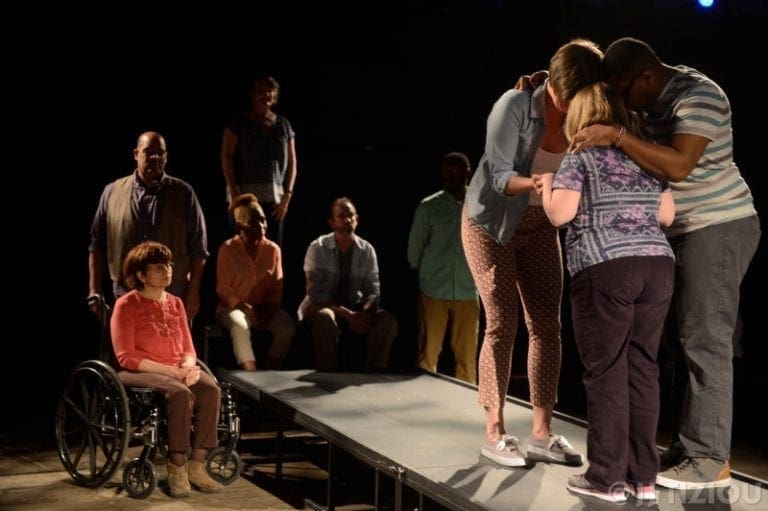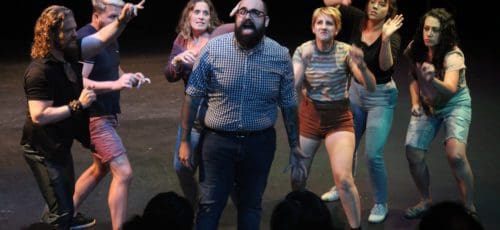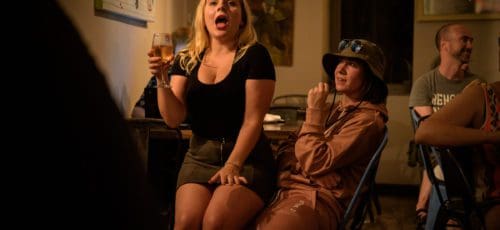Happy Hour on the Fringe: Interview between ADAPT activist Tony Brooks and A Fierce Kind of Love cast member Shawn Aleong
We’re back! On this episode of Happy Hour on the Fringe, A Fierce Kind of Love cast-member Shawn Aleong and ADAPT activist Tony Brooks sit down and talk about living with disabilities in an exclusive world, and the missing history of disability rights advocacy. The podcast episode is now available online or you can read the full transcript down below.
Interview between ADAPT activist Tony Brooks and AFKoL cast member Shawn Aleong
Tony: Hi, I’m Tony Brooks. I live in West Philadelphia. I am an advocate and activist for people with disabilities and a member of ADAPT.
Shawn: Why don’t you tell people what ADAPT is?
Tony: ADAPT is a grass-roots organization of activists and advocates for people with disabilities. Now why don’t you tell people who you are.
Shawn: Hi, my name is Shawn. I am a Temple University student studying legal studies with a minor in real estate. I am also a disability advocate. When I say justice for all I mean justice for all.
Tony: Be it black, white, green, blue. I think what people don’t understand is that everybody has a disability in the first place, you know that, right?
Shawn: Well, I tell people that society has the disability, because they fail to recognize people’s abilities. No matter if you have cerebral palsy, down syndrome, or what have you, we all have an ability. Sometimes societies fail to realize that.
Tony: True. People don’t understand disability or its history – that is one of the problems ADAPT is trying to solve. You remember when the ADA was signed in 1990 by the late George H. W. Bush? He signed it with Justin Dart, a disability activist, and everybody on the White House lawn? But many people don’t know that before the ADA, we just had ADAPT and the Gang of 19. They were the first 19 people with disabilities who broke out of nursing institutions with Reverend Wade Blank. We actually just celebrated the anniversary of the original Gang of 19.
Shawn: Congratulations on your Gang of 19 anniversary!
Tony: No it’s yours too! It is yours too. You see, I just recently got disabled maybe four or five years ago. When I got disabled I noticed that the first thing that happens to you is you are stigmatized.
Shawn: Yes. Very often. As soon as people figure out that you are just a little bit different, they will shut you out.
Tony: Too true, man. We are trying to fight that with ADAPT. We work with an independent living center called Liberty Resources to try and progress our people.
Shawn: Yes, Liberty Resources. Your President is Thomas Earle. I know Thomas Earle very well. Good man, very good man.
Tony: He’s the CEO of Liberty Resources.
Shawn: Liberty Resources is one of the staples in the disability rights movement just like the Institute on Disabilities. I learned most of my advocacy skills from a program at the Institute called the Academy for Adult Learning, which is now Career Studies. When I tell you the Institute has been a major staple in my adult life, it has – I learned how to advocate for myself. That’s why I’m here today because of what the Institute and my mom gave me. The support. We have to make sure that people are educated about the history of the disability rights movement so they can help support us. Like people like Justin Dart, the father of the ADA. People like –
Tony: Ed Roberts, the activist at the University of California.
Shawn: Yes, Ed Roberts. Civil Rights Leaders like Roland Johnson who created the organization Speaking For Ourselves – he was a great advocate for people that have disabilities, who were trapped in institutions. I play him in A Fierce Kind of Love. I like playing him because I can relate to him. Even though he had struggles, he never gave up. All that he’s been through – it just was a stepping stone. And of course then, ADAPT – y’all do a lot. Y’all do protests, y’all stop buses, y’all stop trains.
Tony: Yeah we were the ones who started the curb cuts, which are the concrete ramps that are on the corner of curbs and crosswalks. It wasn’t for mothers rolling their prams, or deliveries to pull their carts across, it was for us – people with physical disabilities. And it’s not just physical disabilities – I see invisible disabilities on us all as well. That’s why I said earlier that everyone in the world has a disability, even if they don’t have it yet. I just met a lady in Denver last month for the anniversary of the Gang of 19, and she told me, in this world, we have two passports: passports that we use to fly around and go wherever we wanna go, and the disability passport. It is when you get the second passport, the disability passport, then you shall see the struggles in life. And it is true. I was born and raised in Ghana. But I came here, I got into a motor-vehicle accident, and this is where I landed. And I noticed immediately how stigmatized I became.
Shawn: Society has always tried to progress on every issue. And I love that dearly, but it seems like when it comes to people with disabilities, it seems like we try to progress but yet –
Tony: We are being dragged down.
Shawn: Right, right! But here’s what I tell people – you have people with disabilities in every culture, in every ethnic group, in every movement –
Tony: In every home.
Shawn: From the Jewish community to the Christian to the LGBTQIA, you have people with disabilities all over, but we need to get to a point that society just looks at us as people. Just normal people. That’s all we are. We cannot sit here and call this a great country until people recognize that it takes everyone to make this a good country. It takes all types of backgrounds, and all times of abilities. And see that’s what I’m trying to get at – I’m no better than you –
Tony: And I’m no better than you. You know, the word inclusion just came to my mind.
Shawn: Inclusion is key. Inclusion is key.
Tony: Inclusion even amongst ourselves. We should understand ourselves in the disability community. They have divided us, they have forgotten that each and every person has a disability. It may be that you are born with it or along the way as you’re growing up, your disability comes along.
Shawn: That’s right, that’s so true.
Tony: But you were right, we are everywhere. Roland Johnson and Ed Roberts, Justin Dart, Reverend Wade Blake, they all came from different backgrounds, and they all wanted to create accessibility. Ed Roberts created independent living centers. That was the same time when Wade Blake was fighting for disabilities also. They did have assistance from other communities, other activist communities. The Black Panthers were some. Reverend Blake got his start with Dr. Martin Luther King, Jr, and marched with him on Bloody Sunday over the bridge in Selma. When Blake came back to Denver where he was like helping in a nursing institution, he didn’t love the way those with physical disabilities were ignored while the abled bodied people could go into the park and enjoy themselves. So he got them together and asked them, what is your interest? What do you want? They said they wanted to leave. So, in 1978, after the first 19 were liberated from the nursing institutions with Reverend Blake, they decided to focus on accessibility for transportation. That is when they were fighting with the buses – leapt in front of the buses, held down the buses for 2 days.
Shawn: Right. And that’s why it’s so important that we educate. Educate people, educate communities, educate corporations so that we can get jobs that we want to work in. And it’s very important that we educate politicians so that they can write policies that benefit all people.
Tony: America had a disabled President!
Shawn: Yes! Yes! Yes!
Tony: America had a disabled President, and no one ever remembers that! The late George who signed the ADA needed assistance, he needed a wheelchair, he needed a companion. They talked about his dog for four days, about the career that the dog had with George, and I’m sitting back, watching all this and twisting my head to the side and saying, really, you would rather talk about a dog than the life that signed the American Disability Act into law – they didn’t really talk much about that. It was really sad. They might have said “he was the one who signed the ADA” but they didn’t explain what it really was.
Shawn: Yeah. How many people do you know who know where the curb cuts originated from? How many people know what the ADA really means? About sensory lighting? ADA friendly buildings?
Tony: How many people think about the labor it takes for us to leave our homes? We leave our homes at five in the morning to get ready to go to work, which is 3 or 4 miles away from where we live. You have to get to work at 8 o’clock to start working at 9-5. They said, okay, for the first four hours go, you have fifteen minutes to rest and get energy. At 12 or 1pm, you go for a 30 minute break, around 3:30 or 4 o’clock, you get another fifteen minute break, and in between this time, they have told you I am going to give you $7.50 an hour. That’s the wage rate in America. The outside world cannot believe that. Especially for a country that is being called the first world, even though it’s not being called that anymore! After the election, I turned on the television and I saw an orange face, yellow hair, a beak, and it said: U.S. AMERICAN PRESIDENT. As if we are not already fighting enough. When we have natural disasters, the disabled community is ignored. We have to educate the government about that. The only thing they want to do is help the people they see as physically healthy. But the disabled community is always forgotten about. That Shawn and I just came to the table to have a conversation – that is what the government is supposed to do too. But they won’t.
Shawn: Educate, advocate, and keep up the good fight. We got to keep on pushing.
Tony: Oh yeah.
Shawn: Togetherness is also the key, because look at back in the day when Dr. Martin Luther King, Jr. fought for everyone’s civil rights. He had a whole sea behind him! And backing him up. And see, that’s what we need to do today.
Lisa [Sonneborn]: So we’re talking a lot about inclusive societies. I would love to hear from each of you what that looks like – Shawn for you, or Tony for you, what is your vision for a truly inclusive society?
Tony: My vision is a community of inclusion of all kinds of disabilities, be it physical or invisible. We all have a disability, the only way we can have included communities is understanding each and every one’s disability. That for me is a community of inclusion – understanding individual needs. Be it a physical, or invisible disability, it’s all part of the community where we live and work in peace.
Shawn: My idea of an inclusive community is no more institutions, jobs for everyone, people with disabilities wouldn’t be judged when they talk or when they make a noise – just looked at as normal people. And live in the community and work in the community, We need affordable housing, good paying jobs, good support systems and a good community. That’s how I believe that we can all be as one.



